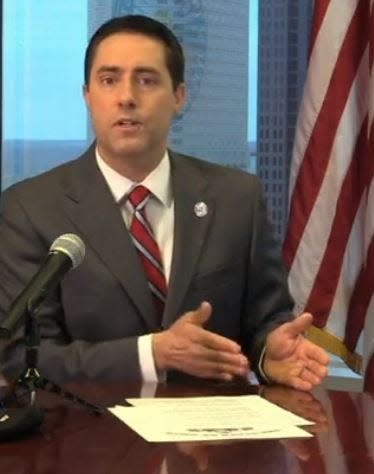Ohio Supreme Court puts QAnon podcaster back on ballot for Secretary of State race

The Ohio Supreme Court ordered Tuesday that QAnon follower and podcaster, Terpsehore Maras, be put on the ballot for Ohio secretary of state this fall.
Maras has supported policies such as returning to a paper ballot system and eliminating all voting machines in Ohio. On her podcast, The Tore Says Show, she has made unproven claims of a stolen presidential election in 2020 and supported QAnon conspiracies.
Earlier this year, Maras filed to run as a Republican with hopes of challenging incumbent Secretary of State Frank LaRose in the May primary, but didn't make it onto the ballot. Now, Maras is running as an independent, but Republicans claimed she did not have the required amount of valid voter signatures to qualify.
Justin Bis, executive director for the Ohio Republican Party, filed the challenge, questioning the validity of 35 of Maras' 5,010 signatures. Ohio requires that candidates collect 5,000 valid voter signatures to get onto the ballot.
"I firmly believe that the basic signature process is clearly defined in the law," Bis wrote in a statement. "If Ms. Maras can't figure it out, then she certainly isn't qualified to be Secretary of State."
The objections to the signatures included incomplete or incorrect addresses, dates, and signatures, including mismatches with what was recorded in the voter registration database.
Attorneys for Maras argued that incomplete addresses were not mandatory under law to compel a signature’s invalidation, and that whether an address was correct or not was up to the local boards of elections.
“We count on the local boards of elections… to know their community,” said Warner Mendenhall, the attorney, who said in smaller places, it’s clear where someone lives even if one doesn’t completely list their entire address.
Mendahall also said that signature mismatches could be due to the awkwardness of signing digitally.
Along with the signatures, Bis also challenged whether Maras was truly an independent candidate. But attorneys for Maras said that anybody has a right to disaffiliate and noted no evidence was formally introduced to prove that.

Former Ohio Supreme Court justice Terrence O’ Donnell, who presided as an independent hearing officer over her initial candidacy hearing, sided with Bis on 18 of the signatures, enough to knock her down below the threshold.
But after an appeal, the Ohio Supreme Court ordered the state to add nine valid signatures back to to the total, putting Maras above the required number of 5,000. Certification forms for those nine signatures were improperly rejected by the Office of the Secretary of State, which had set an earlier deadline for them than it should have, said the majority opinion.
Chief Justice Maureen O'Connor, a Republican, and Democratic Justices Michael Donnelly, Melody Stewart and Jennifer Brunner supported the decision. Republican Justices Pat DeWine and Patrick Fischer dissented, while Justice Sharon Kennedy did not participate.
Democrat Chelsea Clark is also running for secretary of state.
Titus Wu is a reporter for the USA TODAY Network Ohio Bureau, which serves the Columbus Dispatch, Cincinnati Enquirer, Akron Beacon Journal and 18 other affiliated news organizations across Ohio.
This article originally appeared on The Columbus Dispatch: QAnon podcaster should be on ballot, rules Ohio Supreme Court
